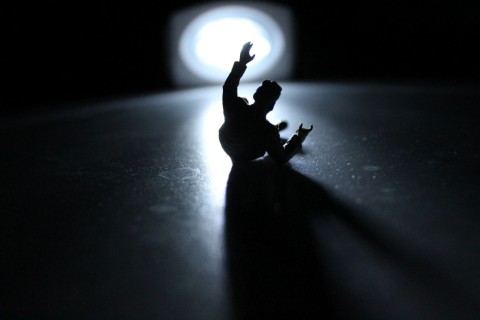“Is there a war?” my grandfather said.
My father explained it to him once and my mother explained it to him once.
They explained how my Uncle Jerry had gone to Jafco’s with his sister Aleya and she had gone to the bathroom and a man had started shooting people.
“That’s war. I know. What you’re talking about is war.”
“Okay, Pop. The point is that Jerry is gone.”
“Soldiers die in wars.”
“Okay, Pop.”
“They’re supposed to give us a flag. They’re supposed to give you a flag when a soldier dies.”
“They gave us a flag.”
“Can I see it?”
“Sure.”
My father left his room and my grandfather fell asleep. He took me and we went to Best and Plenty, on the other side of town from Jafco’s. They only had plastic flags.
“He’s been asking for a flag,” my mother said when we got home.
“Here it is,” my father said.
They gave it to my grandfather and he began to weep.
“He was a good soldier,” my grandfather said.
“Yes, Pop.”
“He killed some of theirs too. Don’t forget that. He killed some of their side.”
“Yes.”
My grandfather stopped weeping and was quiet for a while.
“They had families too, didn’t they? The soldiers he killed.”
“Yes, they had families too.”
I wished it was a war because I could imagine the feeling after a war when all the families of the soldiers who had died in the war could say, we shouldn’t have done this because now we’re both sad. I could imagine that going better. I could imagine them deciding not to have a war again. But I couldn’t imagine a thing like that with my Uncle Jerry going to Jafco’s.
My grandfather sat up straight in bed. “Tell them we don’t want their damn flag,” he said.
“Okay, Pop.”
“Tell them we’d rather have our son back.”
“Okay.”
It was a miserable time in our house. I started to wonder if my Uncle Jerry was a soldier when he went to Jafco’s. Maybe my father and I were soldiers when we went to Best and Plenty. I didn’t like to think it but maybe we were.
If we were soldiers and one of us died at Best and Plenty, then I felt proud that my grandfather didn’t want a flag for us. I knew it was just a plastic one and it wasn’t the real thing, but I hoped my grandfather wouldn’t want one for me too.
It was the only nice thing in our house, seeing my grandfather sit up in bed and say that he didn’t want their flag. I wanted him to keep at it, but I knew it was the kind of thing that wore him out, and pretty soon he was asleep.
“Throw out the flag, Johnny,” my father said.
“Throw it out?”
“Yes, you heard him.”
I threw it out and I hoped my grandfather would remember about the flag when he woke up and we could tell him that we’d told them we didn’t want it. It was quiet while he slept. The only sound was my Aunt Aleya talking. She’d been in the bathroom and she’d hid in there when it happened. She’d come out afterwards and seen the whole thing. She kept saying that it wasn’t what people do. At first I thought she meant the man who had shot everybody, but my mother explained that she meant the people who’d died. She was saying that they didn’t die at Jafco’s like that. She kept saying that people didn’t do that, and sometimes it seemed like she really believed it.

Notes from Guest Reader Jennifer Wortman
I could write a dissertation on the virtues of this story, but for now I’ll say this: ‘A Soldier’ defamiliarizes, with great skill and compassion, the all-too-familiar mass shooting epidemic in the US. In a world turned upside down, the grandfather’s dementia makes the only possible sense of the incomprehensible.

